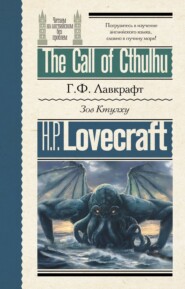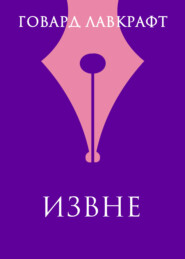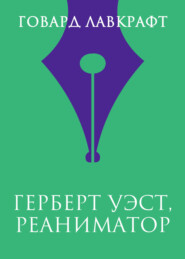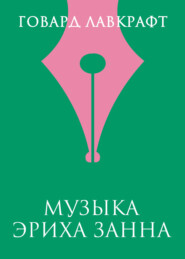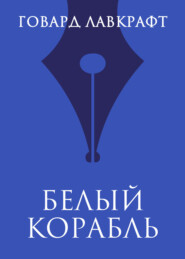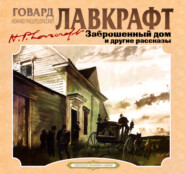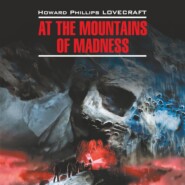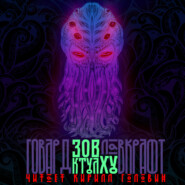По всем вопросам обращайтесь на: info@litportal.ru
(©) 2003-2025.
✖
Selected Stories
Настройки чтения
Размер шрифта
Высота строк
Поля
For a minute I kept sight of the glow of his lantern, and heard the rustle of the wire as he laid it down after him; but the glow soon disappeared abruptly, as if a turn in the stone staircase had been encountered, and the sound died away almost as quickly. I was alone, yet bound to the unknown depths by those magic strands whose insulated surface lay green beneath the struggling beams of that waning crescent moon.
I constantly consulted my watch by the light of my electric lantern, and listened with feverish anxiety at the receiver of the telephone; but for more than a quarter of an hour heard nothing. Then a faint clicking came from the instrument, and I called down to my friend in a tense voice. Apprehensive as I was, I was nevertheless unprepared for the words which came up from that uncanny vault in accents more alarmed and quivering than any I had heard before from Harley Warren. He, who had so calmly left me a little while previously, now called from below in a shaky whisper more portentous than the loudest shriek:
‘God! If you could see what I am seeing!’
I could not answer. Speechless, I could only wait. Then came the frenzied tones again:
‘Carter, it’s terrible — monstrous — unbelievable!’
This time my voice did not fail me, and I poured into the transmitter a flood of excited questions. Terrified, I continued to repeat, ‘Warren, what is it? What is it?’
Once more came the voice of my friend, still hoarse with fear, and now apparently tinged with despair:
‘I can’t tell you, Carter! It’s too utterly beyond thought — I dare not tell you — no man could know it and live — Great God! I never dreamed of this!’
Stillness again, save for my now incoherent torrent of shuddering inquiry. Then the voice of Warren in a pitch of wilder consternation:
‘Carter! for the love of God, put back the slab and get out of this if you can! Quick! — leave everything else and make for the outside — it’s your only chance! Do as I say, and don’t ask me to explain!’
I heard, yet was able only to repeat my frantic questions. Around me were the tombs and the darkness and the shadows; below me, some peril beyond the radius of human imagination. But my friend was in greater danger than I, and through my fear I felt a vague resentment that he should deem me capable of deserting him under such circumstances. More clicking, and after a pause a piteous cry from Warren:
‘Beat it! For God’s sake, put back the slab and beat it, Carter!’
Something in the boyish slang of my evidently stricken companion unleashed my faculties. I formed and shouted a resolution, ‘Warren, brace up! I’m coming down!’ But at this offer the tone of my auditor changed to a scream of utter despair:
‘Don’t! You can’t understand! It’s too late — and my own fault. Put back the slab and run — there’s nothing else you or anyone can do now!’
The tone changed again, this time acquiring a softer quality, as of hopeless resignation. Yet it remained tense through anxiety for me.
‘Quick — before it’s too late!’
I tried not to heed him: tried to break through the paralysis which held me, and to fulfil my vow to rush down to his aid. But his next whisper found me still held inert in the chains of stark horror.
‘Carter — hurry! It’s no use — you must go — better one than two — the slab —’
A pause, more clicking, then the faint voice of Warren:
‘Nearly over now — don’t make it harder — cover up those damned steps and run for your life — you’re losing time — so long, Carter — won’t see you again.’
Here Warren’s whisper swelled into a cry; a cry that gradually rose to a shriek fraught with all the horror of the ages -
‘Curse these hellish things — legions — My God! Beat it! Beat it! BEAT IT!’
After that was silence. I know not how many interminable eons I sat stupefied; whispering, muttering, calling, screaming into that telephone. Over and over again through those eons I whispered and muttered, called, shouted, and screamed, ‘Warren! Warren! Answer me — are you there?’
And then there came to me the crowning horror of all — the unbelievable, unthinkable, almost unmentionable thing. I have said that eons seemed to elapse after Warren shrieked forth his last despairing warning, and that only my own cries now broke the hideous silence. But after a while there was a further clicking in the receiver, and I strained my ears to listen. Again I called down, ‘Warren, are you there?’ and in answer heard the thing which has brought this cloud over my mind. I do not try, gentlemen, to account for that thing — that voice — nor can I venture to describe it in detail, since the first words took away my consciousness and created a mental blank which reaches to the time of my awakening in the hospital. Shall I say that the voice was deep; hollow; gelatinous; remote; unearthly; inhuman; disembodied? What shall I say? It was the end of my experience, and is the end of my story. I heard it, and knew no more — heard it as I sat petrified in that unknown cemetery in the hollow, amidst the crumbling stones and the falling tombs, the rank vegetation and the miasmal vapours — heard it well up from the innermost depths of that damnable open sepulcher as I watched amorphous, necrophagous shadows dance beneath an accursed waning moon.
And this is what it said:
‘You fool, Warren is DEAD!’
HERBERT WEST–REANIMATOR (#ulink_03a0182f-df0e-58e6-91f2-21c0615d4a29)
I. FROM THE DARK
Of Herbert West, who was my friend in college and in other life, I can speak only with extreme terror. This terror is not due altogether to the sinister manner of his recent disappearance, but was engendered by the whole nature of his life-work, and first gained its acute form more than seventeen years ago, when we were in the third year of our course at the Miskatonic University medical school in Arkham. While he was with me, the wonder and diabolism of his experiments fascinated me utterly, and I was his closest companion. Now that he is gone and the spell is broken, the actual fear is greater. Memories and possibilities are ever more hideous than realities.
The first horrible incident of our acquaintance was the greatest shock I ever experienced, and it is only with reluctance that I repeat it. As I have said, it happened when we were in medical school, where West had already made himself notorious through his wild theories on the nature of death and the possibility of overcoming it artificially. His views, which were widely ridiculed by the faculty and by his fellow-students, hinged on the essentially mechanistic nature of life; and concerned means for operating the organic machinery of mankind by calculated chemical action after the failure of natural processes. In his experiments with various animating solutions he had killed and treated immense numbers of rabbits, guinea-pigs, cats, dogs, and monkeys, till he had become the prime nuisance of the college. Several times he had actually obtained signs of life in animals supposedly dead; in many cases violent signs; but he soon saw that the perfection of his process, if indeed possible, would necessarily involve a lifetime of research. It likewise became clear that, since the same solution never worked alike on different organic species, he would require human subjects for further and more specialized progress. It was here that he first came into conflict with the college authorities, and was debarred from future experiments by no less a dignitary than the dean of the medical school himself – the learned and benevolent Dr Allan Halsey, whose work in behalf of the stricken is recalled by every old resident of Arkham.
I had always been exceptionally tolerant of West’s pursuits, and we frequently discussed his theories, whose ramifications and corollaries were almost infinite. Holding with Haeckel that all life is a chemical and physical process, and that the so-called ‘soul’ is a myth, my friend believed that artificial reanimation of the dead can depend only on the condition of the tissues; and that unless actual decomposition has set in, a corpse fully equipped with organs may with suitable measures be set going again in the peculiar fashion known as life. That the psychic or intellectual life might be impaired by the slight deterioration of sensitive brain-cells which even a short period of death would be apt to cause, West fully realized. It had at first been his hope to find a reagent which would restore vitality before the actual advent of death, and only repeated failures on animals had shown him that the natural and artificial life-motions were incompatible. He then sought extreme freshness in his specimens, injecting his solutions into the blood immediately after the extinction of life. It was this circumstance which made the professors so carelessly sceptical, for they felt that true death had not occurred in any case. They did not stop to view the matter closely and reasoningly.
It was not long after the faculty had interdicted his work that West confided to me his resolution to get fresh bodies in some manner, and continue in secret the experiments he could no longer perform openly. To hear him discussing ways and means was rather ghastly, for at the college we had never procured anatomical specimens ourselves. Whenever the morgue proved inadequate, two local negroes attended to this matter, and they were seldom questioned. West was then a small, slender, spectacled youth with delicate features, yellow hair, pale blue eyes, and a soft voice, and it was uncanny to hear him dwelling on the relative merits of Christ Church Cemetery and the potter’s field, because practically every body in Christ Church was embalmed; a thing of course ruinous to West’s researches.
I was by this time his active and enthralled assistant, and helped him make all his decisions, not only concerning the source of bodies but concerning a suitable place for our loathsome work. It was I who thought of the deserted Chapman farmhouse beyond Meadow Hill, where we fitted up on the ground floor an operating room and a laboratory, each with dark curtains to conceal our midnight doings. The place was far from any road, and in sight of no other houses, yet precautions were none the less necessary; since rumours of strange lights, started by chance nocturnal roamers, would soon bring disaster on our enterprise. It was agreed to call the whole thing a chemical laboratory if discovery should occur. Gradually we equipped our sinister haunt of science with materials either purchased in Boston or quietly borrowed from the college – materials carefully made unrecognizable save to expert eyes – and provided spades and picks for the many burials we should have to make in the cellar. At the college we used an incinerator, but the apparatus was too costly for our unauthorized laboratory. Bodies were always a nuisance – even the small guinea-pig bodies from the slight clandestine experiments in West’s room at the boarding-house.
We followed the local death-notices like ghouls, for our specimens demanded particular qualities. What we wanted were corpses interred soon after death and without artificial preservation; preferably free from malforming disease, and certainly with all organs present. Accident victims were our best hope. Not for many weeks did we hear of anything suitable; though we talked with morgue and hospital authorities, ostensibly in the college’s interest, as often as we could without exciting suspicion. We found that the college had first choice in every case, so that it might be necessary to remain in Arkham during the summer, when only the limited summer-school classes were held. In the end, though, luck favoured us; for one day we heard of an almost ideal case in the potter’s field; a brawny young workman drowned only the morning before in Summer’s Pond, and buried at the town’s expense without delay or embalming. That afternoon we found the new grave, and determined to begin work soon after midnight.
It was a repulsive task that we undertook in the black small hours, even though we lacked at that time the special horror of graveyards which later experiences brought to us. We carried spades and oil dark lanterns, for although electric torches were then manufactured, they were not as satisfactory as the tungsten contrivances of today. The process of unearthing was slow and sordid – it might have been gruesomely poetical if we had been artists instead of scientists – and we were glad when our spades struck wood. When the pine box was fully uncovered West scrambled down and removed the lid, dragging out and propping up the contents. I reached down and hauled the contents out of the grave, and then both toiled hard to restore the spot to its former appearance. The affair made us rather nervous, especially the stiff form and vacant face of our first trophy, but we managed to remove all traces of our visit. When we had patted down the last shovelful of earth we put the specimen in a canvas sack and set out for the old Chapman place beyond Meadow Hill.
On an improvised dissecting-table in the old farmhouse, by the light of a powerful acetylene lamp, the specimen was not very spectral looking. It had been a sturdy and apparently unimaginative youth of wholesome plebeian type – large-framed, grey-eyed, and brown-haired – a sound animal without psychological subtleties, and probably having vital processes of the simplest and healthiest sort. Now, with the eyes closed, it looked more asleep than dead; though the expert test of my friend soon left no doubt on the score. We had at last what West had always longed for – a real dead man of the ideal kind, ready for the solution as prepared according to the most careful calculations and theories for human use. The tension on our part became very great. We knew that there was scarcely a chance for anything like complete success, and could not avoid hideous fears at possible grotesque results of partial animation. Especially were we apprehensive concerning the mind and impulses of the creature, since in the space following death some of the more delicate cerebral cells might well have suffered deterioration. I, myself, still held some curious notions about the traditional ‘soul’ of man, and felt an awe at the secrets that might be told by one returning from the dead. I wondered what sights this placid youth might have seen in inaccessible spheres, and what he could relate if fully restored to life. But my wonder was not overwhelming, since for the most part I shared the materialism of my friend. He was calmer than I as he forced a large quantity of his fluid into a vein of the body’s arm, immediately binding the incision securely.
The waiting was gruesome, but West never faltered. Every now and then he applied his stethoscope to the specimen, and bore the negative results philosophically. After about three-quarters of an hour without the least sign of life he disappointedly pronounced the solution inadequate, but determined to make the most of his opportunity and try one change in the formula before disposing of his ghastly prize. We had that afternoon dug a grave in the cellar, and would have to fill it by dawn – for although we had fixed a lock on the house we wished to shun even the remotest risk of a ghoulish discovery. Besides, the body would not be even approximately fresh the next night. So taking the solitary acetylene lamp into the adjacent laboratory, we left our silent guest on the slab in the dark, and bent every energy to the mixing of a new solution; the weighing and measuring supervised by West with an almost fanatical care.
The awful event was very sudden, and wholly unexpected. I was pouring something from one test-tube to another, and West was busy over the alcohol blast-lamp which had to answer for a Bunsen burner in this gasless edifice, when from the pitch-black room we had left there burst the most appalling and demoniac succession of cries that either of us had ever heard. Not more unutterable could have been the chaos of hellish sound if the pit itself had opened to release the agony of the damned, for in one inconceivable cacophony was centred all the supernal terror and unnatural despair of animate nature. Human it could not have been – it is not in man to make such sounds – and without a thought of our late employment or its possible discovery both West and I leaped to the nearest window like stricken animals; overturning tubes, lamp, and retorts, and vaulting madly into the starred abyss of the rural night. I think we screamed ourselves as we stumbled frantically towards the town, though as we reached the outskirts we put on a semblance of restraint – just enough to seem like belated revellers struggling home from a debauch.
We did not separate, but managed to get to West’s room, where we whispered with the gas up until dawn. By then we had calmed ourselves a little with rational theories and plans for investigation, so that we could sleep through the day – classes being disregarded. But that evening two items in the paper, wholly unrelated, made it again impossible for us to sleep. The old deserted Chapman house had inexplicably burned to an amorphous heap of ashes; that we could understand because of the upset lamp. Also, an attempt had been made to disturb a new grave in the potter’s field, as if by futile and spadeless clawing at the earth. That wc could not understand, for we had patted down the mould very carefully.
And for seventeen years after that West would look frequently over his shoulder, and complain of fancied footsteps behind him. Now he has disappeared.
II. THE PLAGUE-DEMON
I shall never forget that hideous summer sixteen years ago, when like a noxious afrite from the halls of Eblis typhoid stalked leeringly through Arkham. It is by that satanic scourge that most recall the year, for truly terror brooded with bat-wings over the piles of coffins in the tombs of Christ Church Cemetery; yet for me there is a great horror in that time – a horror known to me alone now that Herbert West has disappeared.
West and I were doing post-graduate work in summer classes at the medical school of Miskatonic University, and my friend had attained a wide notoriety because of his experiments leading towards the revivification of the dead. After the scientific slaughter of uncounted small animals the freakish work had ostensibly stopped by order of our sceptical dean, Dr Allan Halsey; though West had continued to perform certain secret tests in his dingy boarding-house room, and had on one terrible and unforgettable occasion taken a human body from its grave in the potter’s field to a deserted farmhouse beyond Meadow Hill.
I was with him on that odious occasion, and saw him inject into the still veins the elixir which he thought would to some extent restore life’s chemical and physical processes. It had ended horribly – in a delirium of fear which we gradually came to attribute to our own over-wrought nerves – and West had never afterwards been able to shake off a maddening sensation of being haunted and hunted. The body had not been quite fresh enough; it is obvious that to restore normal mental attributes a body must be very fresh indeed; and the burning of the old house had prevented us from burying the thing. It would have been better if we could have known it was underground.
After that experience West had dropped his researches for some time; but as the zeal of the born sciertist slowly returned, he again became importunate with the college faculty, pleading for the use of the dissecting-room and of fresh human specimens for the work he regarded as so overwhelmingly important. His pleas, however, were wholly in vain; for the decision of Dr Halsey was inflexible, and the other professors all endorsed the verdict of their leader. In the radical theory of reanimation they saw nothing but the immature vagaries of a youthful enthusiast whose slight form, yellow hair, spectacled blue eyes, and soft voice gave no hint of the super-normal – almost diabolical – power of the cold brain within. I can see him now as he was then – and I shiver. He grew sterner of face, but never elderly. And now Sefton has had the mishap and West has vanished.
West clashed disagreeably with Dr Halsey near the end of our last undergraduate term in a wordy dispute that did less credit to him than to the kindly dean in point of courtesy. He felt that he was needlessly and irrationally retarded in a supremely great work; a work which he could of course conduct to suit himself in later years, but which he wished to begin while still possessed of the exceptional facilities of the university. That the tradition-bound elders should ignore his singular results on animals, and persist in their denial of the possibility of reanimation, was inexpressibly disgusting and almost incomprehensible to a youth of West’s logical temperament. Only greater maturity could help him understand the chronic mental limitations of the ‘professor-doctor’ type – the product of generations of pathetic Puritanism, kindly, conscientious, and sometimes gentle and amiable, yet always narrow, intolerant, custom-ridden, and lacking in perspective. Age has more charity for these incomplete yet high-souled characters, whose worst real vice is timidity, and who are ultimately punished by general ridicule for their intellectual sins – sins like Ptolemaism, Calvinism, anti-Darwinism, anti-Nietz-scheism, and every sort of Sabbatarianism and sumptuary legislation. West, young despite his marvellous scientific acquirements, had scant patience with good Dr Halsey and his erudite colleagues; and nursed an increasing resentment, coupled with a desire to prove his theories to these obtuse worthies in some striking and dramatic fashion. Like most youths, he indulged in elaborate day-dreams of revenge, triumph, and final magnanimous forgiveness.
And then had come the scourge, grinning and lethal, from the nightmare caverns of Tartarus. West and I had graduated about the time of its beginning, but had remained for additional work at the summer school, so that we were in Arkham when it broke with full demoniac fury upon the town. Though not as yet licensed physicians, we now had our degrees, and were pressed frantically into public service as the numbers of the stricken grew. The situation was almost past management, and deaths ensued too frequently for the local undertakers fully to handle. Burials without embalming were made in rapid succession, and even the Christ Church Cemetery receiving tomb was crammed with coffins of the unembalmed dead. This circumstance was not without effect on West, who thought often of the irony of the situation – so many fresh specimens, yet none for his persecuted researches! We were frightfully overworked, and the terrific mental and nervous strain made my friend brood morbidly.
But West’s gentle enemies were no less harassed with prostrating duties. College had all but closed, and every doctor of the medical faculty was helping to fight the typhoid plague. Dr Halsey in particular had distinguished himself in sacrificing service, applying his extreme skill with whole-hearted energy to cases which many others shunned because of danger or apparent hopelessness. Before a month was over the fearless dean had become a popular hero, though he seemed unconscious of his fame as he struggled to keep from collapsing with physical fatigue and nervous exhaustion. West could not withhold admiration for the fortitude of his foe, but because of this was even more determined to prove to him the truth of his amazing doctrines. Taking advantage of the disorganization of both college work and municipal health regulations, he managed to get a recently deceased body smuggled into the university dissecting-room one night, and in my presence injected a new modification of his solution. The thing actually opened its eyes, but only stared at the ceiling with a look of soul-petrifying horror before collapsing into an inertness from which nothing could rouse it. West said it was not fresh enough – the hot summer air does not favour corpses. That time we were almost caught before we incinerated the thing, and West doubted the advisability of repeating his daring misuse of the college laboratory.
The peak of the epidemic was reached in August. West and I were almost dead, and Dr Halsey did die on the fourteenth. The students all attended the hasty funeral on the fifteenth, and bought an impressive wreath, though the latter was quite overshadowed by the tributes sent by wealthy Arkham citizens and by the municipality itself. It was almost a public affair, for the dean had surely been a public benefactor. After the entombment we were all somewhat depressed, and spent the afternoon at the bar of the Commercial House; where West, though shaken by the death of his chief opponent, chilled the rest of us with references to his notorious theories. Most of the students went home, or to various duties, as the evening advanced; but West persuaded me to aid him in ‘making a night of it.’ West’s landlady saw us arrive at his room about two in the morning, with a third man between us; and told her husband that we had all evidently dined and wined rather well.
Apparently this acidulous matron was right; for about three A.M. the whole house was aroused by cries coming from West’s room, where when they broke down the door they found the two of us unconscious on the blood-stained carpet, beaten, scratched and mauled, and with the broken remnants of West’s bottles and instruments around us. Only an open window told what had become of our assailant, and many wondered how he himself had fared after the terrific leap from the second storey to the lawn which he must have made. There were some strange garments in the room, but West upon regaining consciousness said they did not belong to the stranger, but were specimens collected for bacteriological analysis in the course of investigations on the transmission of germ diseases. He ordered them burnt as soon as possible in the capacious fireplace. To the police we both declared ignorance of our late companion’s identity. He was, West nervously said, a congenial stranger whom we had met at some downtown bar of uncertain location. We had all been rather jovial, and West and I did not wish to have our pugnacious companion hunted down.







